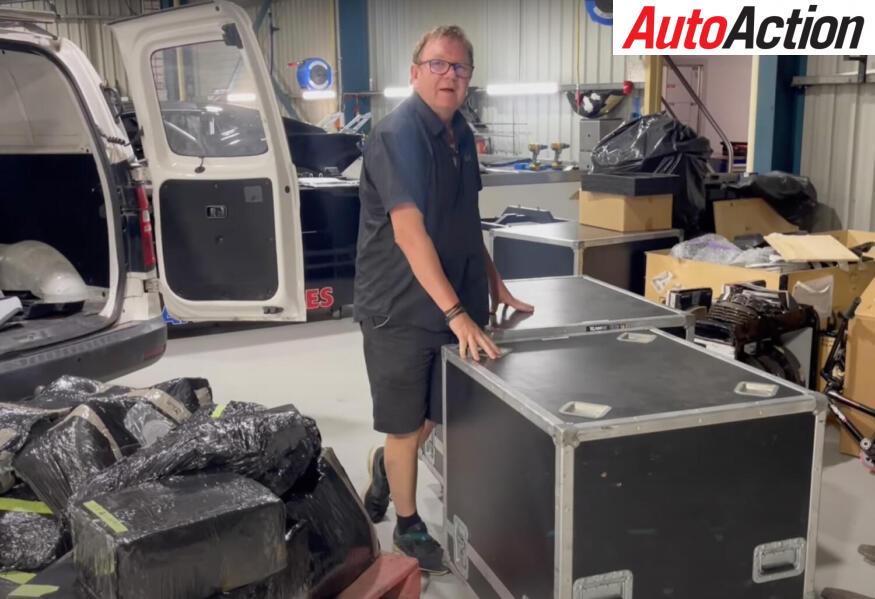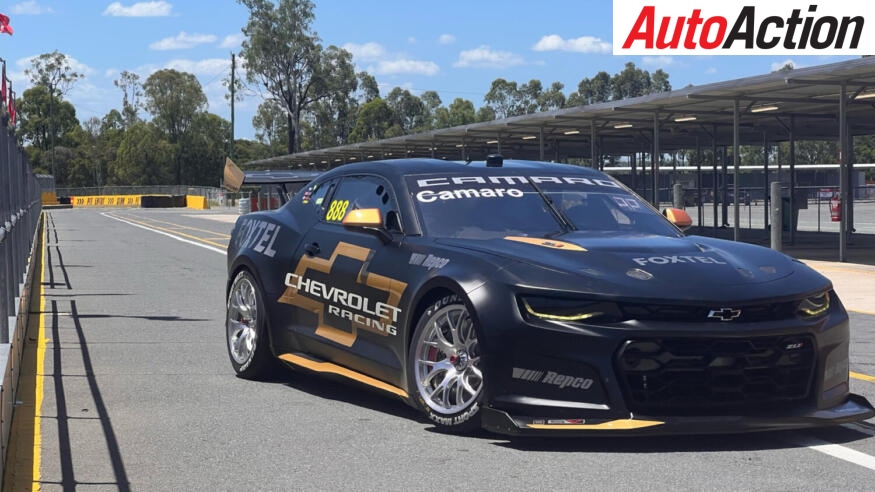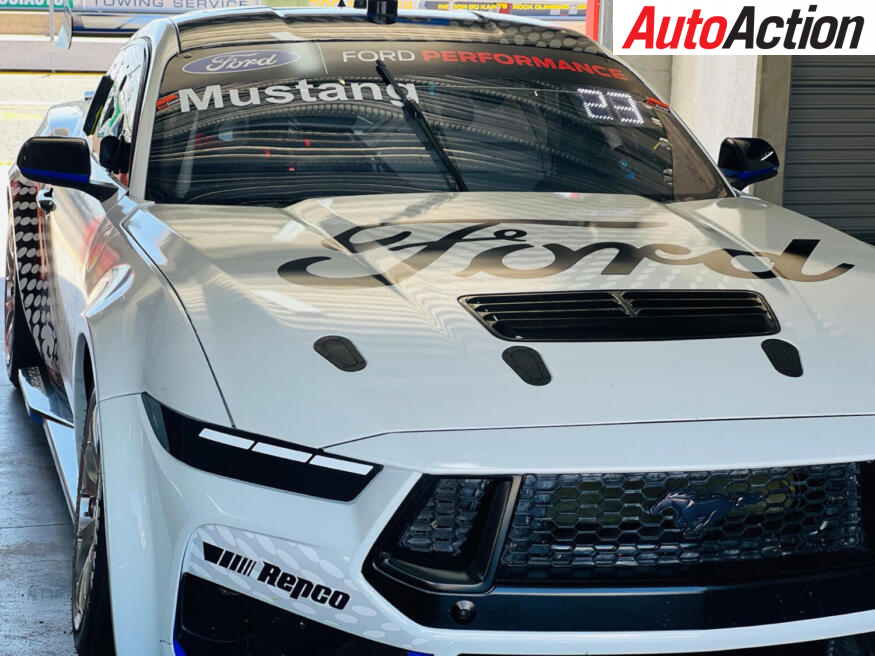Supercars teams welcome first Gen3 engine allocations

By Thomas Miles
Date posted: 26 January 2023
Supercars teams have welcomed the arrival of the new Gen3 engine with the first allocation being delivered this week.
It was a moment of relief for teams, with the first scheduled shakedown of the new Gen3 cars just four days away for the Queensland based outfits at Ipswich on Monday, January 30.
Winton is scheduled to host the Victorian teams two days later, but that is in doubt after Erebus Motorsport CEO Barry Ryan hinted his cars may not be ready for another fortnight.
Brad Jones Racing has received two of its four Chevrolet Camaro engines and team principal Brad Jones compared the delivery to a Christmas present.

Brad Jones with a recently arrived Gen3 engine at the Albury base. Image: Brad Jones Racing YouTube
“It is Wednesday night, but it feels like it is Christmas,” Jones said on YouTube.
“We have got engines turn up for our first two cars, all the exhaust work looks like it is here, the bar work and the bonnet, so we can piece all of that together.
“We are still waiting for the under tray and a few bits and bobs we need to come through from Queensland (but) we have some composite parts and have a bit to do over the next few days and the boys will be getting stuck into it.”
BJR and all 11 Supercars teams received their respective engines through an online lottery system allocation process.

The Gen3 Chevrolet Camaro in the pits at Queensland Raceway.
A single engine supplier for each car is one of the many key changes taking place ahead of the 2023 Supercars Championship, with the 14 Chevrolet Camaros powered by KRE Race Engines and the 11 Ford Mustangs being looked after by Herrod Performance Engines.
The process to randomly distribute the engines to the squads was done by a computerised random number generator, supervised by team principles, Supercars CEO Shane Howard and head of motorsport Adrian Burgess.
All engines were dynamometer tested by Supercars engine expert Craig Hasted to ensure parity before the draw took place.
Burgess said the process was the best way of ensuring there was no threat of “favouritism” in each engine.

The new Gen3 Ford Mustang sitting in the garage at a recent test at Queensland Raceway.
“Given suppliers could not predict which particular engine would go where, not saying they would, but the lottery meant there was no scope for the builders to favour any team,” he said.
“This will ensure drivers have equal opportunity to perform at their best when they hit the track.
“No one will build a special engine for a special customer.”
Matt Stone Racing team principal Matt Stone said his team was “keen” to receive a Gen3 engine, which was a major box to tick on the road to the first round in Newcastle.
“We’ve all been pretty keen to get our hands on the engines,” Stone told Supercars.com.
“The lottery was something different, but it’s done to make sure it was fair and open.
“It’s good to have that key part of the Gen3 puzzle done so we can learn more about the cars.
“For us now, it’s about ticking the boxes and getting it done right.
“It’s really exciting — it’s the biggest undertaking that we’ve done, by far.
“We want to get out onto the track as soon as possible, but we want the cars to be 100 per cent ready.
“We’ll keep working away and get it all done right.”
Eventually every team will possess two engines per Supercar, while Supercars will conduct random checks on each Gen3 engine throughout the year to assess their durability.
The first time all 25 Gen3 Supercars are expected to be on track together will be Wednesday, February 22 at Sydney Motorsport Park after earlier tests and shakedowns for the Queensland and Victorian teams at Ipswich and Winton respectively.
For more of the latest motorsport news pick up the latest issue of AUTO ACTION.
AUTO ACTION, Australia’s independent voice of motorsport
Recent Stories
array (
0 =>
WP_Term::__set_state(array(
'term_id' => 11,
'name' => 'Latest News',
'slug' => 'latest-news',
'term_group' => 0,
'term_taxonomy_id' => 11,
'taxonomy' => 'category',
'description' => '',
'parent' => 0,
'count' => 16766,
'filter' => 'raw',
'cat_ID' => 11,
'category_count' => 16766,
'category_description' => '',
'cat_name' => 'Latest News',
'category_nicename' => 'latest-news',
'category_parent' => 0,
)),
1 =>
WP_Term::__set_state(array(
'term_id' => 38,
'name' => 'Supercars',
'slug' => 'supercars',
'term_group' => 0,
'term_taxonomy_id' => 38,
'taxonomy' => 'category',
'description' => 'The Supercars Championship, currently known as the Repco Supercars Championship, is the premier motorsport category in Australasia and one of Australia\'s biggest sports. It originated from the Australian Touring Car Championship (ATCC), which held its first race in 1960 at Gnoo-Blas in Orange, New South Wales. The ATCC evolved over the years, and in 1997, it was rebranded as the V8 Supercars Championship, eventually becoming the Supercars Championship we know today.
Some of the leading drivers in the history of the Supercars Championship include Peter Brock, who is often referred to as the "King of the Mountain" for his nine victories at the Bathurst 1000, a race that is considered one of the biggest in the series. Other notable drivers include Dick Johnson, Marcos Ambrose, Craig Lowndes, Shane van Gisbergen, Jamie Whincup, who holds the record for the most championship titles, and Mark Skaife, who has also been a dominant force in the series.
The Bathurst 1000, held at Mount Panorama Circuit in Bathurst, New South Wales, is arguably the most famous race in the Supercars calendar. Other significant races include the Sandown 500 and the Adelaide 500, which are known for their challenging circuits and thrilling competitions.
The Supercars Championship has grown to become a globally recognized series, known for its competitive racing and passionate fan base. It continues to be a major part of Australia\'s motorsport culture, attracting top drivers and teams from around the world.',
'parent' => 0,
'count' => 5615,
'filter' => 'raw',
'cat_ID' => 38,
'category_count' => 5615,
'category_description' => 'The Supercars Championship, currently known as the Repco Supercars Championship, is the premier motorsport category in Australasia and one of Australia\'s biggest sports. It originated from the Australian Touring Car Championship (ATCC), which held its first race in 1960 at Gnoo-Blas in Orange, New South Wales. The ATCC evolved over the years, and in 1997, it was rebranded as the V8 Supercars Championship, eventually becoming the Supercars Championship we know today.
Some of the leading drivers in the history of the Supercars Championship include Peter Brock, who is often referred to as the "King of the Mountain" for his nine victories at the Bathurst 1000, a race that is considered one of the biggest in the series. Other notable drivers include Dick Johnson, Marcos Ambrose, Craig Lowndes, Shane van Gisbergen, Jamie Whincup, who holds the record for the most championship titles, and Mark Skaife, who has also been a dominant force in the series.
The Bathurst 1000, held at Mount Panorama Circuit in Bathurst, New South Wales, is arguably the most famous race in the Supercars calendar. Other significant races include the Sandown 500 and the Adelaide 500, which are known for their challenging circuits and thrilling competitions.
The Supercars Championship has grown to become a globally recognized series, known for its competitive racing and passionate fan base. It continues to be a major part of Australia\'s motorsport culture, attracting top drivers and teams from around the world.',
'cat_name' => 'Supercars',
'category_nicename' => 'supercars',
'category_parent' => 0,
)),
2 =>
WP_Term::__set_state(array(
'term_id' => 2029,
'name' => 'ZZZ-Email',
'slug' => 'email',
'term_group' => 0,
'term_taxonomy_id' => 2029,
'taxonomy' => 'category',
'description' => '',
'parent' => 2031,
'count' => 7323,
'filter' => 'raw',
'cat_ID' => 2029,
'category_count' => 7323,
'category_description' => '',
'cat_name' => 'ZZZ-Email',
'category_nicename' => 'email',
'category_parent' => 2031,
)),
3 =>
WP_Term::__set_state(array(
'term_id' => 2031,
'name' => 'ZZZ-RSSFeeds',
'slug' => 'zzz-rssfeeds',
'term_group' => 0,
'term_taxonomy_id' => 2031,
'taxonomy' => 'category',
'description' => '',
'parent' => 0,
'count' => 6678,
'filter' => 'raw',
'cat_ID' => 2031,
'category_count' => 6678,
'category_description' => '',
'cat_name' => 'ZZZ-RSSFeeds',
'category_nicename' => 'zzz-rssfeeds',
'category_parent' => 0,
)),
)









